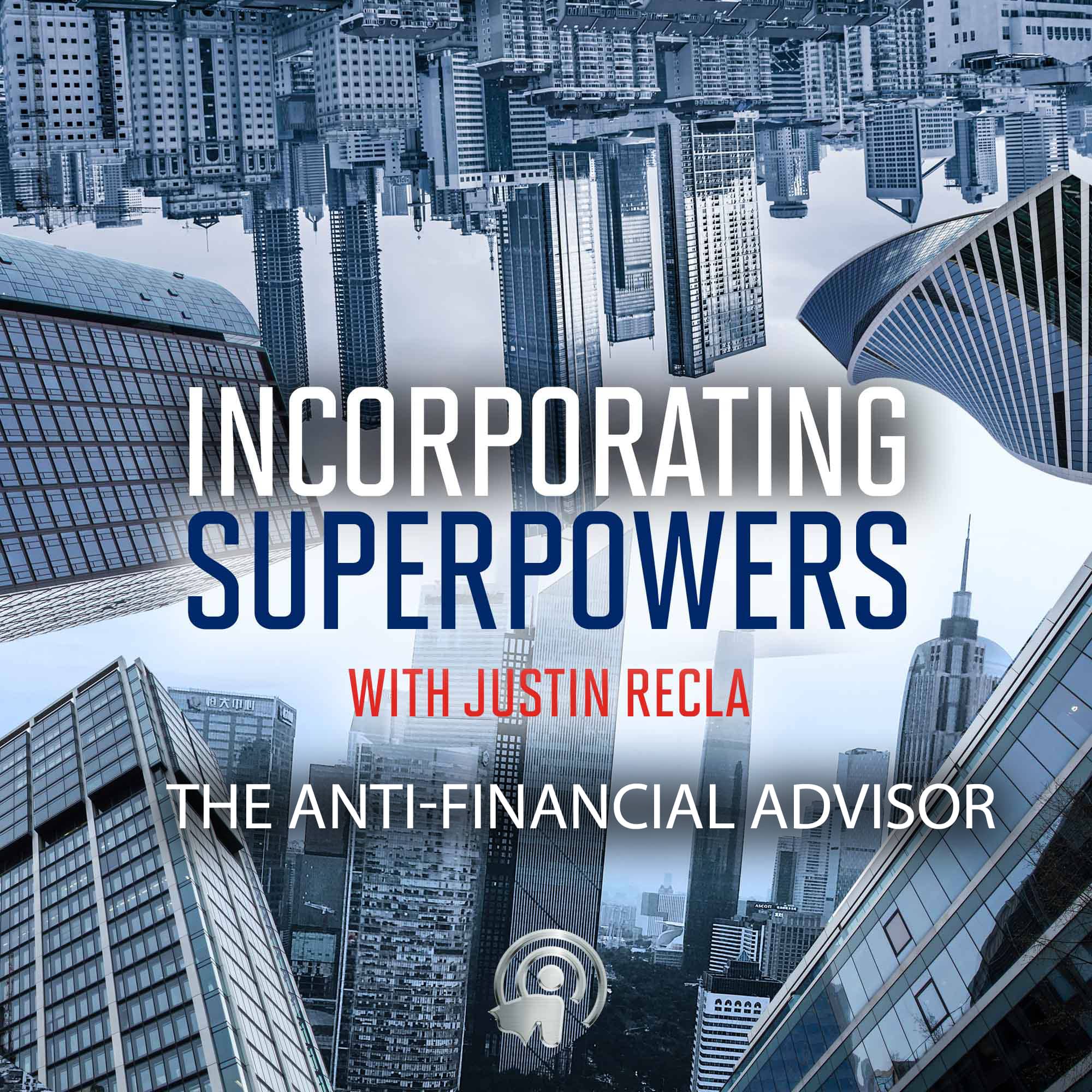
The Anti-Financial Advisor
Why is there such a thing as an anti-financial advisor? In this episode of Incorporating Superpowers, host Justin Recla and guest Chris Miles sit together to talk about mind setting and money. Chris is the host of the Chris Miles Money show and he considers himself the anti-financial advisor. Their conversation also revolves around how money works and the differences between a scarcity mindset, a spending mindset, and a Steward mindset. Tune in as this episode delves deeper into the perspective of an anti-financial advisor.
Justin Recla:
Welcome back to Incorporating SuperPowers. And today is one of my favorite topics. We’re going to be talking about money, money, money. More importantly, we’re going to be looking at money completely backward, something that you’ve probably never been taught in your life, or you’ve had lessons on this. You’ve seen it, but you don’t quite understand it. And we’re going to be exploring money from well, the exact opposite of what you were taught in grade school, high school and college. We’re going to be looking at how money works.
And my guest today has been in the financial industry for the last 20-some-odd years. But more importantly, he’s been doing the work that he has been doing, which is the exact opposite of what the industry will teach you, for the last 15 years. He considers himself the anti-financial advisor, and he is the host of The Chris Miles Money Show. My guest is Chris Miles. Chris, welcome to the show today.
Chris Miles:
Hey, it’s such a pleasure to be here, Justin.
Justin Recla:
This is good stuff, Chris. One, first and foremost, I love your website. This is great. And I love what you’re doing in the world. The fact that you call yourself the anti-financial advisor, that’s huge. So talk to me a little bit about what is the Anti-financial Advisor. We know what a financial advisor is. What’s the anti-financial advisor?
Chris Miles:
Well, pretty much everything that you hate about a financial advisor, that’s what we don’t do. So that’s really what it is. If you think about financial advising, the way it’s been taught, it’s always been to save everything, spend nothing, save it forever, save it for the long haul, take high risk, hopefully, get some kind of return, save it in their mutual funds. Pretty much whatever they sell you, that’s what you should be buying. And it’s always a good time to buy whether the market’s up or down. And then hopefully someday you might have something.
And the truth is that that’s just rooted in massive scarcity, which scarcity drives away money. It doesn’t actually create any prosperity. It drives it all away and doesn’t actually have real results. In fact, that’s what I learned the first four years of being a financial advisor in the early 2000s was that when I really looked at the evidence, there weren’t people becoming financially free.
Even the clients that had decades of advice previously, were still worried about running out of money. It was this very much a scarcity focus. Oh, will it be enough? And that’s the problem. And if you look at the financial advisor’s lives, ask any financial advisor you know. Say, “Hey, if all of a sudden your business and all your commissions were cut off today, including the commissions that pay you renewals, if that were all cut off today, would you be able to retire right now with the mutual funds you’ve got?”
And the answer is most likely no. In fact, I would say almost 100% of the time it’s going to be a no. Even for people who have been doing this for decades, they still can’t get financially free. So why are we following the same advice? It’s that definition of insanity, doing the same thing over and over and expecting a different result. Why are we following it?
Justin Recla:
Well, we were following it because that’s what everybody teaches us. That’s what they tell us to do in school. In high school, the most we get to learn how to do is write a check. And then, of course, when we go into college is where we’re taught to where all we have to do is acquire debt, so we can go get a job. And nobody’s really teaching the truth of how money works and what it is. And you and I were talking before the break. We were talking about flow and stagnation and how saving and so forth and not putting your money in the right places causes blockages because you’re right. The world, this universe, this world that we live in is abundant, and we have to stop looking at it from a scarcity viewpoint.
Chris Miles:
Exactly. Its principles and strategies. You’ve got to have the right principles of prosperity, those abundant principles that have been around forever. They’re timeless laws. You’ve got to apply those along with the strategies to make it work so that you work because you want to, not because you have to, so that you’re free, that you live an abundant life and have that prosperity.
And the problem is that if you look at there are really three mindsets around money. If you really break it down, it comes down to three. Two of them are rooted in scarcity, which about, I would say, the vast majority of people fall into. One of them is having a saver mindset. This is the one that every financial advisor comes from. They’re always telling you to save everything, spend nothing, pay off your debt as fast as possible.
And then, in fact, when you’re in that mode, in that way of thinking, the problem is that you can never pay off debt fast enough. And even if you do become debt-free, then you can’t ever save enough. You can ever accumulate enough. And then you end up being what I call a lot of people I’ve come to have become clients who are asset rich and cash poor. They’ve accumulated and hoarded a lot of money, but it’s not working for them. It’s not doing anything. There’s no life or flow.
And without flow, there’s no life. If there’s no water flow, there’s not going to be life to the land. If there’s no blood flow, there’s no life to your body. And if there’s no money flow, you’ll financially be dead too. And that’s what it runs into. So the savers, that’s the more subtle one that people think is what’s supposed to work, but that’s the one that doesn’t.
And we know, of course, the spender is the other second scarcity one too. Spenders, by the way, are minorities. Savers are actually a bigger majority than the spenders are, I’ve found. It’s funny because there’s a lot of the people in the saver mentality, especially the Dave Ramseys of the world that will tell you, “Hey, you know what? Everybody’s a spender. You guys aren’t. We’re the people who’ve got to stand up.” The truth is if you look at the real numbers, more people are saving in their 401ks than not, that has a 401k. And by the way, I’m not a fan of the 401k.
So that even tells you that even people eligible for 401k that aren’t doing it are in a different mindset, a different mode that’s more abundant.
Justin Recla:
This is good stuff. This is good stuff. I want to pause right here because I want to save the rest of this conversation for the backside of the break because I don’t want to give up the ghost too much here. Because this is the conversation that diving into and understanding this, folks, and understanding how money works and taking a look at the paradigm that you’ve been taught and stepping out of it and looking at something different from a different and higher perspective are going to change the way your view on money works. And that’s why I’m excited to have this conversation with Chris on the back end. But before we do, where can we go? Where can people go to start to learn more about you?
Chris Miles:
They can go to moneyripples.com, or they can check out our podcast, The Chris Miles Money Show, that you can find on any platform, YouTube, iTunes, you name it.
Justin Recla:
Fantastic. Folks, go take a look at Chris Miles’ show, The Chris Miles Money Show. Subscribe to his podcast. This is a conversation that you need to continue having well beyond this episode. Stay tuned. We’ll be right back.
For the best listening experience, download the Superpower Network App
Podcast: Play in new window

